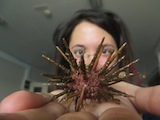Salomé Fabri-Ruiz PhD thesis
Defended on the 7th December 2018
Funding: French ministry of research
Supervisors: Thomas Saucède (université de Bourgogne) and Bruno Danis (université libre de Bruxelles)
Started in October 2015
Abstract
Current environmental changes, which impact marine environments, cover major scientific and societal issues, especially as these environmental changes are expected to accelerate along the 21st century. Understanding and forecasting the response of marine biodiversity to these changes is a pregnant scientific issue. Biogeographic and macroecological approaches provide a scientific framework for that prupose. They allow describing and understanding species distribution patterns at large spatial scale as well as estimating their potential shift with regards to environmental change. This is particularly true in the Southern Ocean, where the effects of climate change are already occurring and where environmental changes could have a deep and manifold impact on the structure and functioning of marine ecosystems. Despite recent sampling efforts, our knowledge of the Southern Ocean species distributions still faces many shortcomings due to the rather recent discovery of this ocean, its isolation and remoteness along with difficult access conditions. In this context, the aims of this thesis are to better understand the factors that drive species distribution patterns at the Southern Ocean scale, and to assess the impact of climate change on their distribution. For this purpose, different types of Species Distribution Models (SDM) have been used (correlative and mechanistic). Echinoids (sea urchins), which are common organisms of benthic communities in the Southern Ocean, have been used as a biological model for this work.
- extrait:
- lien_externe:
- kc_data:
- a:8:{i:0;s:0:"";s:4:"mode";s:0:"";s:3:"css";s:0:"";s:9:"max_width";s:0:"";s:7:"classes";s:0:"";s:9:"thumbnail";s:0:"";s:9:"collapsed";s:0:"";s:9:"optimized";s:0:"";}
- kc_raw_content:

Defended on the 7th December 2018
Funding: French ministry of research
Supervisors: Thomas Saucède (université de Bourgogne) and Bruno Danis (université libre de Bruxelles)
Started in October 2015
Abstract
Current environmental changes, which impact marine environments, cover major scientific and societal issues, especially as these environmental changes are expected to accelerate along the 21st century. Understanding and forecasting the response of marine biodiversity to these changes is a pregnant scientific issue. Biogeographic and macroecological approaches provide a scientific framework for that prupose. They allow describing and understanding species distribution patterns at large spatial scale as well as estimating their potential shift with regards to environmental change. This is particularly true in the Southern Ocean, where the effects of climate change are already occurring and where environmental changes could have a deep and manifold impact on the structure and functioning of marine ecosystems. Despite recent sampling efforts, our knowledge of the Southern Ocean species distributions still faces many shortcomings due to the rather recent discovery of this ocean, its isolation and remoteness along with difficult access conditions. In this context, the aims of this thesis are to better understand the factors that drive species distribution patterns at the Southern Ocean scale, and to assess the impact of climate change on their distribution. For this purpose, different types of Species Distribution Models (SDM) have been used (correlative and mechanistic). Echinoids (sea urchins), which are common organisms of benthic communities in the Southern Ocean, have been used as a biological model for this work.
